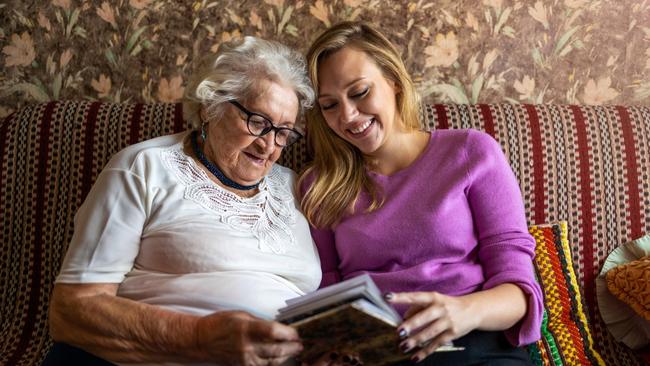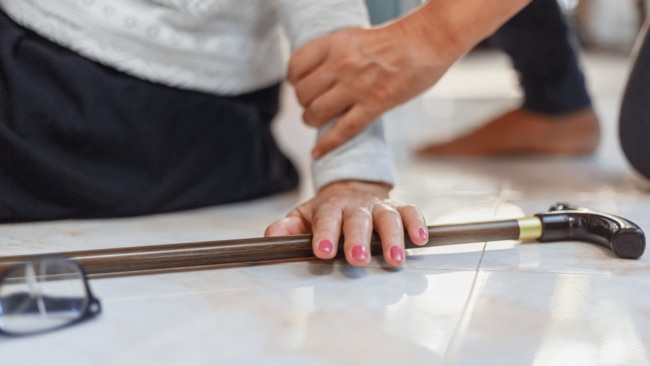How to find hope after a dementia diagnosis
Light at the end of the tunnel

Lifestyle
Don't miss out on the headlines from Lifestyle. Followed categories will be added to My News.
Almost 1.6 million of us care for someone living with dementia. Keri Kitay became one of them when her mother was unexpectedly diagnosed with younger-onset Alzheimer’s at the age of just 54. Here’s what she wants you to know.
Mothers don’t often mistake their own daughter for ‘the other woman’. But this is precisely what happened to Keri Kitay on a trip to Hawaii with her parents, Martin and Terry. “They were going for two weeks and I went with them for the first one,” recalls the Sydney-based author and communications professional. “During that week, mum was so difficult and wouldn’t have a bar of me. She was in a foul mood the whole time.”
Terry’s demeanour changed as soon as Keri left Hawaii. She was happy and affable, although she did ask Martin pointedly, “Who was that woman you were with all week?”
“I can laugh about it now,” recalls Keri. “But she genuinely didn’t know that I was her daughter.”
Terry had been diagnosed about three years earlier, at just 54, with younger-onset Alzheimer’s, also known as early-onset Alzheimer’s, a form of dementia described in people under 65. This insidious and incurable brain condition progressively impacts thinking, memory, mood and behaviour, and eventually physical functioning.

Over eight years, Keri watched the most important person in her life slowly slip away, losing a piece of herself every so often. She’d gone from being a capable, happy mother, wife, sister and friend, to a person withdrawn and unable to look after herself,’ writes Keri in her powerful and moving memoir, The Long Goodbye: Lessons on Humanity from the Grips of Alzheimer’s. Terry passed away in 2019.
Keri says that writing The Long Goodbye was cathartic and “a calling”. And somewhat necessary, given the stats. Dementia is the leading cause of death for Australian women and the second leading cause of death for all Aussies. According to Dementia Australia, an estimated 421,000 people live with dementia and this number could double by 2054.
“I want to help the next family that goes through it and to educate people around dementia,” says Keri. “If close to a million people are affected, there’s a lot of education that needs to happen.”
Terry’s untimely diagnosis completely blindsided the Kitay family. The South African-born mother of three was “an avid dancer, tennis player and social butterfly” writes Keri. She volunteered for various charities from a young age and never said a bad word about anyone. A close friend always called Terry an Eshet Chayil (‘woman of valour’), which to Jewish people refers to the perfect woman. Above all else, Terry was devoted to her family and ran the household like a pro. “She was our biggest champion. She was very kind… and she loved to laugh.”

So, when Terry started withdrawing socially, becoming forgetful and losing confidence in driving – even though “directions were her forte”, says Keri – her family was baffled. Everyday tasks became confusing and distressing. She suddenly struggled to prepare the Business Activity Statement (BAS) for her husband’s dental practice, which she’d been doing effortlessly for years. It took the family a couple of years to put two and two together and seek help. “We don’t have a family history of dementia, so didn’t consider it to be a possibility,” Keri adds. “I didn’t even know that you could get Alzheimer’s in your 50s.”
After the diagnosis, Keri, her dad Martin and her brothers Ricky and Greg set about giving Terry, “the most selfless person in the world”, the best support possible. She lived at home with Martin until that was untenable, and inevitably moved into a facility with round-the-clock care. The family was heartbroken, but the time that they spent with Terry became more purposeful and meaningful, explains Keri. “It was about being with her and stimulating her, as opposed to worrying about that caring aspect of it – which can be highly confrontational.”
They spent hours going through family photo albums with Terry. They brought her art supplies since she loved to paint. They played totem tennis with her. Sometimes they would simply sit outside in the fresh air together, even in winter, following the sunshine as it moved around the garden. “Among all the sadness, we did have some really beautiful moments with Mum,” she recalls.
While Keri is the first to admit that she wouldn’t wish her family experience on anyone, she knows she’s not alone, and hopes that her book will support others experiencing a similar difficult journey. At the end of the day, she says, helping someone who you love retain their dignity and sense of joy means everything.

How to help a loved one with dementia to live well
#1. Communicate clearly
Try not to overwhelm a person with dementia with instructions, says Barbara Williams, Director of Client Services at Dementia Australia. “Instead of saying to the person, ‘Come on, get up, get dressed, we’ve got a doctor’s appointment, so we need to leave by 10 this morning,’ convey one message at a time. Once they’re dressed, say the next step, and so on. It makes it easier for them to retain, and understand, the information.”
#2. Seek out sunlight
Exposure to sunlight is vital for people with dementia, as it helps with melatonin production and vitamin D levels, explains Professor Henry Brodaty from the Centre for Healthy Brain Ageing. A lack of sunlight can also increase strong mood swings, fatigue, irritability and anxiety in people with dementia, particularly in the late afternoon – known as ‘sundowning’. He recommends encouraging a nap after lunch, provided it doesn’t exceed 45 minutes (which can interfere with night-time sleep).

#3. Set up their space with intention
Because dementia can affect a person’s balance and spatial awareness, Williams advises reducing clutter in the home, arranging furniture so there are clear paths through rooms and ensuring there are non-slip coverings on the floor. “You can put things that a person uses regularly out in an obvious place, or label cupboards,” she explains. “These things can help people independently stay safe and oriented in their own home.”
#4. Focus on what’s possible
According to Brodaty. It’s important to focus on what a person living with dementia can do, versus what they can’t, which bolsters dignity and self-esteem. Whether they’re into piano or poker, it’s empowering for those with dementia to do activities they’ve always loved, even if they struggle to do them as well as they used to.
#5. Lastly, take care of yourself
Supporting a person with dementia can be rewarding, but it can also be physically and emotionally demanding, adds Williams. “The needs of a person who is living with dementia will increase over time as their dementia progresses, which in turn takes up more of a carer’s time and energy.” If the carer becomes depleted, they’re at risk of becoming unwell. “Then neither person will be in a good place. Carers are entitled to time to themselves.” In short, always remember that self-care is key.
More Coverage
Originally published as How to find hope after a dementia diagnosis




